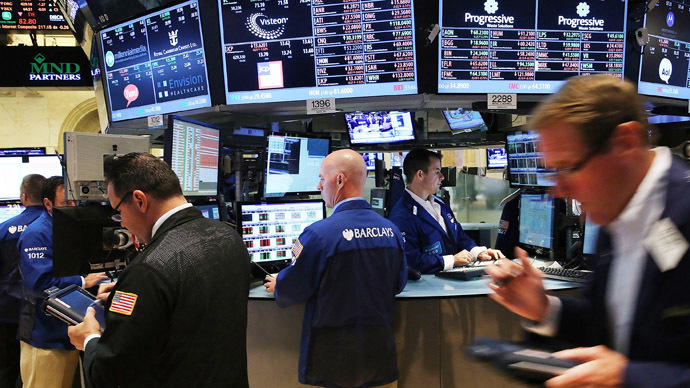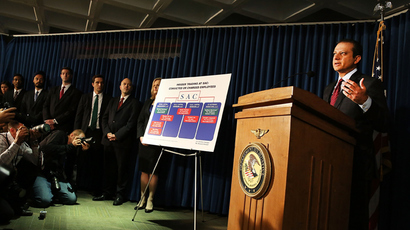Market Buzz: Investors weary ahead of Fed notes

Trading across world stock exchanges is expected to be slow on Monday, as investors are weighing the consequences of an anticipated phasing out of the US central bank's unprecedented stimulus program.
Recent public statements by Fed policymakers have led investors
to conclude that the Fed will begin winding down its $85 billion
a month in bond purchases starting as early as September.
“I would not be surprised to see a little bit more slop in the
equity markets here over the coming days and weeks,” Mark
Luschini, chief investment strategist at Janney Montgomery Scott
LLC, told Bloomberg.
“I expect Russian floors to start a trading session on August
19 close to the levels of Friday close,” said Ekaterina
Kondrashove of Investcafe.
Recent economic data and public statements by Fed policymakers
have led investors to conclude that the Fed will begin winding
down its $85 billion a month in bond purchases starting as early
as September. Falling bond yields in the US is one sign that
traders believe the Fed's move is imminent.
Asian equities have inched down on Monday, with Hong Kong’s Hang
Seng down 0.09 percent and Australia’s S&P down 0.27 percent.
The Nikkei rose 0.11 percent after the Ministry of Finance
released positive export data, which showed an increase in
exports of 12.2 percent in July.
The Micex finished Friday trading at 1,382.40, up 0.15 percent,
and the dollar-based RTS closed at 1333.15, up 0.74 percent. Both
indexes fell roughly 0.2 percent last week.
Gazprom Neft, the country’s fourth-largest oil producer, rallied
over the past week, advancing to $18.96. This marked the third
consecutive week of growth – the longest stretch of weekly gains
since February.
Rusal, the world’s largest aluminum company, in wake of falling
aluminum prices and a weakening ruble, reported a first half year net loss
of $458 million. The company will continue to reduce production
by 9 percent through 2013.
Both WTI and Brent are trading high, with WTI up 0.04 percent at
$107.50 per barrel, and Brent up 0.03 percent at $110.43. Prices
surged last week as the political situation
destabilized as both pro and anti-Morsi protesters took to the
streets of Cairo. The deteriorating situation in Egypt sparked
fears that supplies through one of the world's largest oil
gateways, the Suez Canal, could be affected.
On Monday, Spain will hold an auction of 10-year government
bonds, which could stoke movement on European floors. Amsterdam’s
EURO STOXX gained 0.65 percent, Britain’s FTSE 100 rose 0.26
percent, France’s CAC is trading high at 0.75 percent, and
Germany’s Dax increased 0.19 percent.
American shares slid as household companies like Walmart and
Cisco reported disappointing performances. The Standard and Poor
500 Index experienced its biggest drop in two months, closing
down 0.33 percent Friday, along with decreases in the Dow Jones
by 0.2 percent, and 0.9 percent in the Nasdaq basket. Shares will
likely continue their slump leading up to Wednesday’s Federal
Reserve notes on the bond-buying tapering program.














